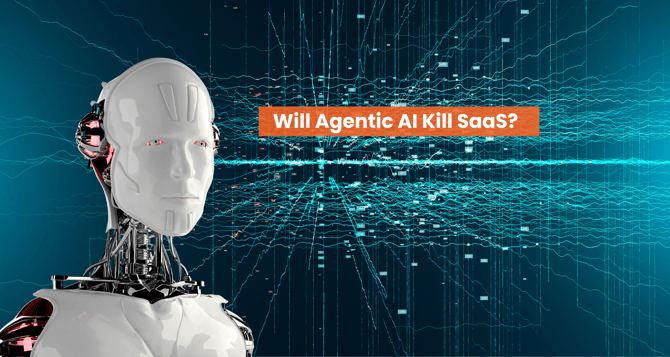The Great Debate: Will Agentic AI Kill SaaS?
The debate over whether Agentic AI will replace SaaS has escalated significantly. This blog explores how AI agents transform workflows and shift SaaS models.

We are entering a world of autonomous agents, where intelligent agents don't wait for user inputs to take action; they take the initiative, make decisions, and collaborate to achieve results.
However, there is a hype surrounding whether these AI agents will also end the traditional world of Software as a Service (SaaS).
This blog will settle the debate by answering the query: Will agentic AI replace SaaS?
Let us begin.
 Generate
Key Takeaways
Generating...
Generate
Key Takeaways
Generating...

- Agentic AI improves SaaS platforms by automating tasks, creating new market opportunities, and enabling innovative revenue models.
- Businesses that combine structured SaaS systems with adaptive AI agents will see significant benefits.
- Companies using AI agents in their SaaS workflows will enhance efficiency and drive better outcomes.
Why Agentic AI Has SaaS Leaders Worried?
Microsoft CEO Satya Nadella has sparked debate
with his views on the impact of agentic AI on the Software as a Service (SaaS) industry.
Nadella argued that Agentic AI will fundamentally disrupt the traditional SaaS model of business applications built on coded business logic.
AI agents will automate and orchestrate tasks across systems and applications, potentially replacing layers that don't create customer value or lack competitive advantages like network effects or data moats, he said.
He also suggested that the core business logic that is CRUD operations – Create, Read, Update, Delete- currently embedded in SaaS applications will migrate to an AI layer. Here, intelligent agents will operate across multiple databases and applications, independent of backend systems. This could lead to companies replacing traditional backends with AI agents.
5 Ways Agentic AI Is Changing SaaS Today
Agentic AI is changing various industries, and software-as-a-service platforms are no exception. Examine how agentic process automation is changing the SaaS below.
1. Automation of Complex Tasks
Agentic AI can automate multi-step workflows that were previously difficult or impossible to automate with traditional SaaS solutions.
2. Shift to the Value Proposition
The focus may move from offering software as a tool for humans to use towards providing outcomes delivered by AI agents.
3. Expansion of the Addressable Market
Agentic AI can address tasks previously requiring human labor, opening up a much larger market opportunity beyond traditional software budgets.
4. New Revenue Models
The introduction of new revenue models can lead to innovative pricing models beyond the traditional per-seat subscriptions. This could potentially favor outcome-based or consumption-based models.
5. Enhanced Efficiency
Agentic AI can improve efficiency by eliminating delays and bottlenecks in workflows.
In short, rather than replacing SaaS, agentic AI will enhance it, creating a powerful hybrid model that redefines enterprise software.
Real-World Examples of Agentic AI Enhancing SaaS
Rather than killing SaaS, agentic AI is evolving it. A prime example is “Salesforce,” which has introduced “Einstein Copilot.” It is an AI-powered agent that proactively assists users across the platform. And instead of waiting for manual queries, the Copilot can
-
Suggest next-best actions
-
Draft personalized emails
-
Auto-generate reports
-
And even identify sales opportunities, all autonomously.
Thinking of how to integrate AI agents into your business Strategy?
Connect with our AI consulting experts to have clarity on using AI agents in SaaS workflows for driving efficiency and innovation.
Why is Agentic AI the Talk of the Town?
We have already heard about trending AI services like conversational AI or virtual assistant agents bringing an entirely new dimension to businesses. These autonomous agents operate on the higher levels.
They independently perform tasks, make decisions, and drive results. In the context of generative AI, these autonomous agents integrate large language models with planning, memory, and tool-use capabilities.
In fact, AI agents can
- Use external tools to gather data and perform actions.
- Divide goals into subtasks and sequence actions.
- Learn from feedback
- Adapt in real time & much more
Also Read: Agentic AI vs Traditional Automation: Which Gives the best Enterprise ROI?
What does the Future Anticipate?
While agentic AI presents a clear threat to SaaS, it also offers significant potential to enhance and augment these platforms.
|
Model |
Role of AI |
Human Involvement |
Real-World Maturity |
|
Replacement |
Fully autonomous agents |
Minimal to none |
Still theoretical |
|
Augmentation |
Embedded assistants |
Human-led, AI-augmented |
Rapidly growing adoption |
|
Hybrid SaaS + Agentic AI |
Proactive AI + connected tools |
Collaborative decision-making |
Already in deployment |
1. Replacement Model
SaaS continues to be a foundation. AI also depends on existing infrastructure. So, SaaS won’t be replaced. Software-as-a-service platforms provide structured, scalable, and secure operations that are essential for enterprises.
2. Augmentation
AI Enhances SaaS. SaaS platforms integrate agentic AI as intelligent assistants that enhance user productivity. Think of agents suggesting actions, auto-completing tasks, and initiating workflows, while humans remain in control. This model is already seeing wide adoption.
3. Hybrid Model
The future is hybrid. A more likely scenario involves a blend of AI-enhanced SaaS platforms. We can expect a combination of the strengths of both technologies.
A hybrid approach can be a practical and powerful path for building software companies. With the amalgamation, the core business logic can be replaced with agentic AI. While existing SaaS behavior can remain for tasks that require stability, governance, and structured control.
Where agentic AI solves real problems, integrate it; where structure is needed, rely on traditional SaaS components.
Bottom Line
We hope this blog has provided you with clarity on the debate. To conclude, AI agents will augment, but not replace, SaaS. So, at this stage, companies should begin by incorporating AI capabilities into their platforms as core components that support autonomous workflows. The companies that embrace this combination can redefine their role in an AI-driven world. Get in touch with our AI strategic consultants to see how you can leverage AI agents in SaaS workflows.


%201-1.webp?width=148&height=74&name=our%20work%20(2)%201-1.webp)


.png?width=344&height=101&name=Mask%20group%20(5).png)









.png?width=352&name=Leading%20Agentic%20AI%20Tools%20%20(1).png)







